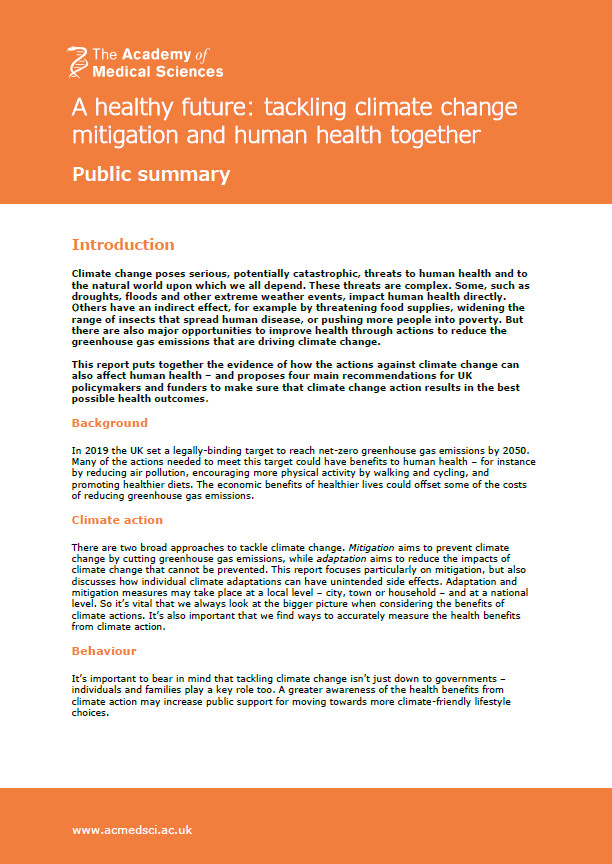The UK Academy of Medical Sciences and the US National Academy of Medicine are teaming up to place health at the heart of the climate emergency – the greatest threat humankind has ever faced. Below, our President Professor Dame Anne Johnson PMedSci and Professor Victor Dzau, President of National Academy of Medicine share their reflections on the joint workshop held this past summer.
Rising temperatures driven by greenhouse gas emissions are triggering profound changes all across the globe. We are becoming all too familiar with extreme weather events, wild fires and dramatic changes in previously stable ecosystems. Human activities are driving these changes– and it is within our power to respond. But we need to act now.
Recent years have seen a shift in thinking about the climate emergency. It is no longer seen as an abstract threat for the future but as something that is happening now. Also critical has been a reframing of the climate emergency to focus on its impact on human health – as outlined in the Academy of Medical Sciences’ and Royal Society’s recent report A healthy future: Tackling climate change mitigation and human health together.
On 11–12 July 2022, the Academy of Medical Sciences and the National Academy of Medicine co-hosted a workshop focused on the health impacts of climate change. The aim was to take stock of the current situation, to identify ways in which the medical and scientific communities in the two countries can respond, and to discuss further cooperation between the two academies to address this existential threat to humankind.
The meeting detailed the damaging impacts of climate change on health and how these are projected to increase if we do not act with urgency. One critical theme was that the worst impacts of the climate emergency will be felt by the most vulnerable and disadvantaged populations, emphasising the critical link between climate change and health equity.
But more positively, we heard examples of successful efforts to mitigate climate change, by reducing greenhouse gas emissions and protecting land use, and to promote adaptation so that communities are protected against the most damaging aspects of a changing environment. Furthermore, many of these interventions not only have impacts on climate change but will also deliver health benefits. As one speaker put it, “a climate intervention is a health intervention.”
One immediate priority is to decarbonise health systems. The National Health Service (NHS) in the UK is a leader in this area, with ambitious targets to become net zero by 2045. In this area, the United States has the challenge of a more fragmented health system with extensive private sector involvement, but concerted efforts across multiple stakeholders are being made to drive forward decarbonisation programmes.
Some of the ideas raised include a joint statement on climate change and health, using the Academies’ power to bring together stakeholders, continuing to support decarbonisation of health systems (and research systems), promoting communication to different audiences, particularly the public, and giving a voice to the younger generation. We also need to put our own houses in order and address decarbonisation of the Academies’ own activities.
One other take-home from the workshop was that the health effects of the climate emergency cannot be disentangled from impacts in other sectors – including the environment and biodiversity, food systems, transport systems, and urban planning. The health community has been slow to grasp the climate nettle and too siloed in its responses. We need to place health at the centre of the climate narrative and work with stakeholders in other fields, including other academies, to drive forward responses that benefit both the climate and health, ensuring we leave no groups behind.
Around the world, we have still not absorbed the scale of the threat we face. But messages of doom and gloom can convey a sense of helplessness. We can do something, and the changes we can could save and enhance countless lives – as another speaker put it, we can turn a burden into a benefit. By working together, we hope to play our part in ensuring that the response to the climate crisis has a transformative impact on the health of all people, including the most vulnerable and disadvantaged.
Read more about the Academy's ongoing work on climate change and health.


